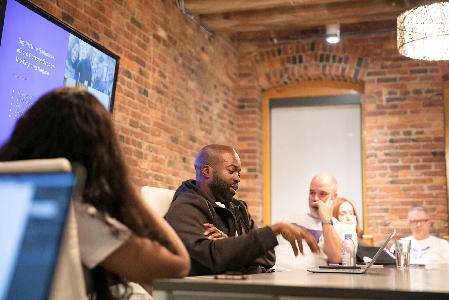Two years after Mayor Michael Nutter issued an open data executive order, Philadelphia has a new Chief Data Officer: Tim Wisniewski.
Wisniewski, 26, of Northern Liberties, has long been a fixture of the city’s civic hacking scene, participating in hackathons and building apps before he was a city employee. In four years, the amiable, if buttoned-up, Southampton, Pa., native rose from hobbyist hacker to 311 mobile app project manager to Philadelphia’s first Director of Civic Technology. Wisniewski was appointed Chief Data Officer after his predecessor, Mark Headd, quit, amid frustrations with some city departments, last April.
Now, with less than two years of the Nutter administration remaining, how does Wisniewski plan to carry out the mayor’s executive order and instill open data in the city’s bones? We sat down with him to hear his top three priorities. Here’s what he told us:
- Release data that’s geared toward the public. Wisniewski wants to release data that’s in a format that’s accessible for all Philadelphians, not just the “1 percent” that knows how to use an API. “We want to make sure we’re reaching 100 percent of Philadelphians,” he said. That means more public-facing apps, like the property assessment calculator and the crime map that’s on the Philly Police website, not just data in spreadsheets and other machine-readable formats released on developer library Github. Wisniewski wants to use the city’s landing page, phila.gov, to push open data to city dwellers.
- Empower agencies to take ownership of open data releases. The language should not be “the City of Philadelphia released this data” or “the Office of Innovation and Technology released this data,” but that “this city agency released this data,” Wisniewski said. Ideally, the city’s data team will help agencies release data but it’ll be an effort that the agencies own themselves. It’s one way to make sure the open data ethos lasts, he said. That way, he said, “it’s less about any one individual’s tenure, and more about how we do business as a government.”
- Use data to drive open data decisions. Wisniewski and his team are analyzing and collecting data — Right to Know requests, input from community stakeholders — to see what data the city should release. Data releases shouldn’t be based on anecdotal evidence or the needs of one particular community. He plans to release an “Open Data Census” this summer, which will present his team’s findings, including a “top 20” list of high-value data sets. One data set on that list is city contracts for commodities (objects, rather than services).
Wisniewski also stressed the importance of relationship building, saying that his job would be 99 percent about people and 1 percent about technology. To insiders, it’s a comment that calls his predecessor to mind: Headd pointed to a strained relationship between himself and Revenue Commissioner Clarena Tolson as one reason he felt he could no longer do his job.
Like Headd, Wisniewski remains active in the local technology scene, attending most every weekly Code for Philly civic hacking meetup, participating as a mentor in Girl Develop It‘s summer open source fellowship and attending hackathons.
Wisniewski will lead a staff of 14. While the OIT is open to hiring another Director of Civic Technology, it’s not the focus right now, he said.
Before you go...
Please consider supporting Technical.ly to keep our independent journalism strong. Unlike most business-focused media outlets, we don’t have a paywall. Instead, we count on your personal and organizational support.
3 ways to support our work:- Contribute to the Journalism Fund. Charitable giving ensures our information remains free and accessible for residents to discover workforce programs and entrepreneurship pathways. This includes philanthropic grants and individual tax-deductible donations from readers like you.
- Use our Preferred Partners. Our directory of vetted providers offers high-quality recommendations for services our readers need, and each referral supports our journalism.
- Use our services. If you need entrepreneurs and tech leaders to buy your services, are seeking technologists to hire or want more professionals to know about your ecosystem, Technical.ly has the biggest and most engaged audience in the mid-Atlantic. We help companies tell their stories and answer big questions to meet and serve our community.
Join our growing Slack community
Join 5,000 tech professionals and entrepreneurs in our community Slack today!





